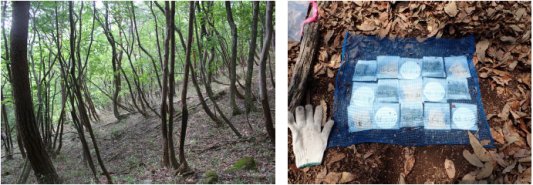Presenter: Ryosuke Nakamura (Mission Research Fellow, RISH Kyoto University)
Title: Forests as a self-sustainable ecosystem — significance of leaf decomposition
Place: Online
Associated Mission: Mission 1 (Environmental Diagnosis and Regulation of Circulatory Function)
If you would like to participate, please e-mail me your name, affiliation and e-mail address by 10 am on the day.
(Open Seminar Office: rish-center_events@rish.kyoto-u.ac.jp)
Abstract
There is a wide consensus that forests are key in climate change mitigation, but we still have much to learn about how plant-microbial-soil interactions contribute to self-sustainability of forest ecosystems. In this talk, I will outline what we know about decomposition of dead leaves by microbes that is crucial for understanding of the self-sustainability of forest. I will highlight my work on Mt. Oe in Northern Kyoto, where natural ecosystems established on the rock that contains high concentrations of heavy metals such as nickel provide a perfect opportunity to investigate how leaf decomposition interacts with various environmental stresses (heavy metal toxicity, poor nutrient condition and low water availability in the soil). Here, I will report that slow decomposition of dead leaves from trees could delay cycling of nutrients in the ecosystem established on the rock with high concentrations of heavy metals, but trees are able to manage their lives in such a harsh environment in a manner that differs by species. The knowledge we gain from Mt. Oe could also be used for phytoremediation technologies to collect hazardous substance in the contaminated soil.
 Fig. 1 Photos from fieldwork on Mt. Oe, Kyoto. Forest ecosystem established on serpentine rock that is characterized by small trees owing to severe environmental stress (left). Decomposition experiment with various substrates (green tea, cellulose filter, coffee filter) to investigate the ability of microbes to decompose organic matter (right).
Fig. 1 Photos from fieldwork on Mt. Oe, Kyoto. Forest ecosystem established on serpentine rock that is characterized by small trees owing to severe environmental stress (left). Decomposition experiment with various substrates (green tea, cellulose filter, coffee filter) to investigate the ability of microbes to decompose organic matter (right).
PDF file(318 046 bytes) | Top
15 July, 2020


